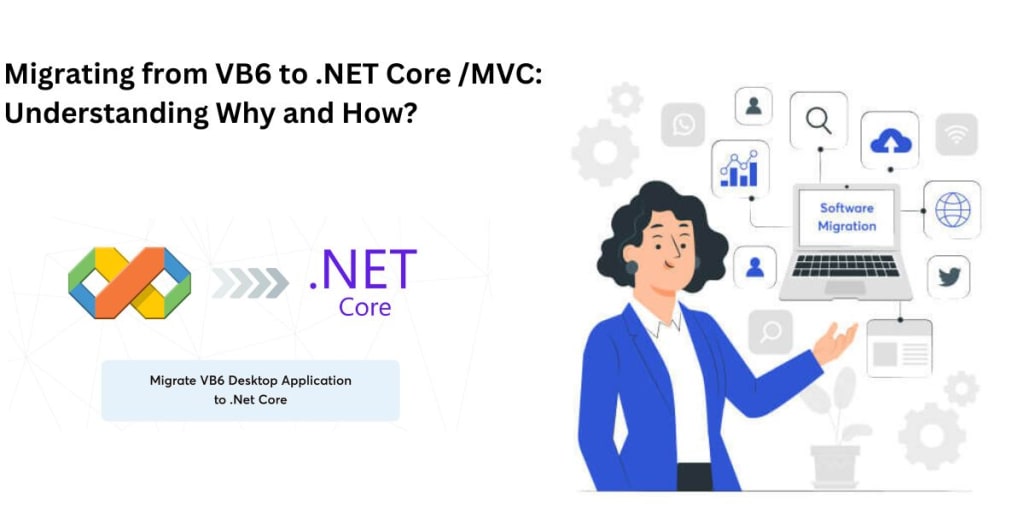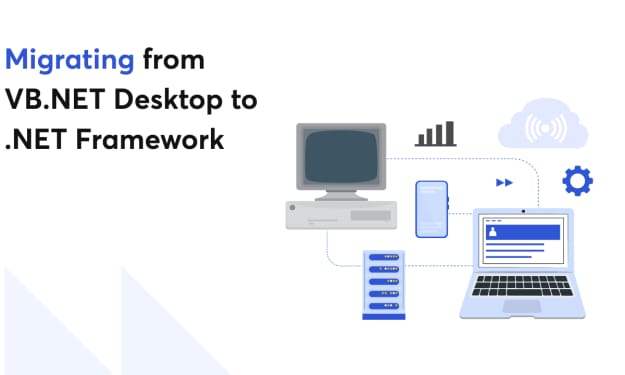Migrating from VB6 to .NET Core: Understanding Why and How?
Want to Migrating From your Legacy VB6 Desktop to .NET Core , Here is the Blog to Understanding Why and How?

Introduction:
Keeping up with the latest technologies and frameworks is vital, especially in this competitive digital era. Modern organizations are converting their legacy systems and approaching application modernization agencies to migrate their legacy applications. Those with VB6 system are utmost need to transform their system to modern .NET Core and MVC system, So, if you want to want to migrate your legacy systems to modern technologies, this blog explores the benefits and of porting VB6 to .NET Core/MVC and provides a roadmap for a successful migration process.
1. Understanding the Need for Legacy Software Modernization:
Legacy software modernization is crucial for organizations seeking improved performance, scalability, and maintainability. By migrating from VB6 to .NET Core, businesses can reap numerous advantages, including:
Cross-platform compatibility: .NET Core enables applications to run on multiple operating systems, expanding the potential user base.
Enhanced performance: Leveraging .NET Core's performance improvements can significantly boost application speed and responsiveness.
Scalability and maintainability: The modular architecture of .NET Core/MVC simplifies maintenance and extensibility, supporting agile development practices.
Access to modern frameworks and libraries: Migrating to .NET Core/MVC unlocks the vast ecosystem of libraries and frameworks available in the .NET ecosystem.
2. Assessing the Current Application for Legacy Software Modernization:
Before initiating the migration process, a comprehensive assessment of the existing VB6 application is crucial. Identify key functionality, dependencies, and potential challenges to guide your planning and resource allocation.
3. Planning the Migration Strategy with an Application Modernization Agency:
Engaging an application modernization agency helps ensure a successful transition. Follow these key steps:
- Establish clear objectives and define success criteria for the modernization project.
- Prioritize functionality to be migrated based on business impact and dependencies.
- Determine the most suitable approach—gradual or full migration—based on your application's complexity and organizational needs.
- Plan for data migration, ensuring compatibility and integrity throughout the process.
- Develop a comprehensive test strategy to validate the functionality of the modernized application.
4. Redesigning and Refactoring for Application Modernization:
During the migration, take the opportunity to evaluate and enhance the application's architecture and design. Adopting the MVC (Model-View-Controller) pattern improves separation of concerns, code organization, and testability. Refactor the codebase using modern coding practices, leveraging object-oriented principles and design patterns.
5. Porting VB6 to .NET Core/MVC:
Porting VB6 to .NET Core/MVC requires meticulous attention to detail. Although there is no automatic converter, application modernization agencies utilize tools and utilities to assist in the migration process. Tasks may include code conversion, UI component re-implementations, and updating third-party integrations.
6. Testing and Quality Assurance for Modernized Applications:
A robust testing strategy ensures the modernized application performs as expected. Develop a comprehensive test suite to validate functionality, performance, and integration with external systems. Leveraging automated testing frameworks aids in efficient regression testing.
7. Deployment and Post-Migration Support:
After successfully migrating and thoroughly testing the application, plan the deployment strategy. Consider the hosting environment, deployment tools, and processes to ensure a seamless transition. Post-migration, provide continuous support and maintenance to address any issues or performance bottlenecks.
Certainly! Here are a couple of code examples to illustrate the process of migrating from VB6 to .NET Core.
VB6 Code Example:

Equivalent .NET Core/MVC Code Example:

In the VB6 code example, a button click event handler performs a simple addition calculation and displays the result in a message box.
In the .NET Core/MVC code example, a controller named Calculation Controller handles the calculation. It defines an action method named Calculate that takes two integer parameters (num1 and num2). The method performs the addition calculation and returns the result as a string.
By Porting VB6 to .NET Core/MVC, you can take advantage of the improved structure, separation of concerns, and testability offered by the MVC pattern. The .NET Core/MVC code is written in C#, which is the recommended language for developing .NET Core applications.
These examples demonstrate a simple scenario, but the migration process involves converting and refactoring more complex portions of the codebase. It's important to analyze your existing VB6 code, identify the necessary changes, and adapt it to the .NET Core/MVC framework while considering best practices and design patterns.
Remember that the migration process may vary depending on the specific requirements and complexity of your application.
Conclusion:
Modernizing legacy software by migrating from VB6 to .NET Core/MVC empowers organizations with improved performance, scalability, and maintainability. While the migration process requires careful planning, thorough testing, and attention to detail, the benefits of working with an application modernization agency and embracing a modern development framework outweigh the challenges. By following a structured approach and leveraging best practices, businesses can seamlessly transition from VB6 to .NET Core/MVC, unlocking the potential for future growth and innovation in their applications.
About the Creator
Kevin Bhut
I am a young entrepreneur with an ambition to transform businesses with tech advent. I am the Co-Founder and CEO of Codzagarage, a leading application modernization agency in the USA. Visit us at codzgarage.com






Comments
There are no comments for this story
Be the first to respond and start the conversation.